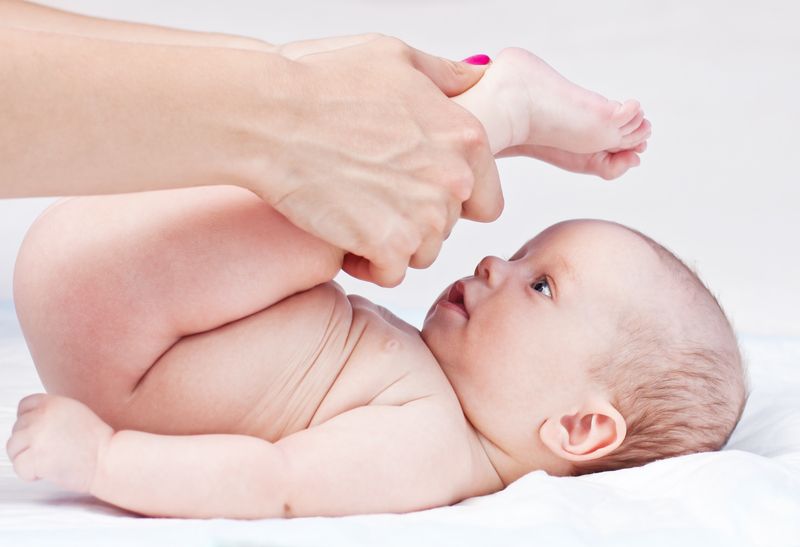Mucus in the Stool
Discovering mucus in your baby's diaper isn't always a cause for concern; however, there may be instances where an underlying problem requires attention.

A mother may be confused as to whether her baby's stools are normal, and one common concern is the presence of mucus in the stool ('often misspelled as mucous in the stool').

The frequency, composition, odor, color, and appearance of your baby's stools will differ daily. A typical baby's stool is a light tan to dark brown, and the consistency is soft, loose, and seedy. It is also normal for a baby to have the occasional pale yellow or dark green stool accompanied by blood or mucus, especially if you are breastfeeding.
Blood and mucus are often found together in stool because they share some of the same causes. Mucus may also lead to diaper rash.
Keeping a Record of Stools
Keeping a record of the frequency and color of your baby's stools is recommended, especially if your baby has streaks of blood in their poop. Also, take note of your baby's fussiness during each day and the food consumed by you and your baby. This way, you will notice any emerging patterns and whether an elimination diet is necessary.
When introducing solids, keep track of the foods your baby eats. If they are allergic to anything, at least you will have an idea of what.
What Causes Mucus in Baby Stool?
Mucus in baby poop is mostly normal!
A certain amount of mucus is created by the intestines and is present naturally to help your baby pass their stools easily; this mucousy baby poop may appear as slimy stings or streaks or may even have a jellyish appearance.
A breastfed baby's stools move through the gut quickly; therefore, they are likely to be accompanied by much more mucus than the stools of their formula-fed counterparts. The mucus formed from normal digestion should gradually become less as solid foods are introduced after six months.
However, sometimes the mucus may indicate something else, namely:
Bleeding Nipples
During the first weeks of breastfeeding, you might experience cracked and bleeding nipples; this blood may show in your baby's stool. Finding a combination of normal mucus (mentioned above) and blood in the stool might unnecessarily cause a mother to worry. You might notice that your baby's spit-up contains streaks of blood too. As soon as your nipples have healed, your baby's stools should return to normal.
If your nipples are cracked and bleeding, please check your latch. Also, visit a local la Leche league. They can assess the situation and advise accordingly; their services are free.
Unrefined coconut oil is a wonderful nipple cream; it is antibacterial, anti-fungal, and rich in antioxidants. Be sure to get raw, organic unrefined coconut oil. It is absorbed quickly and has been found to strengthen the tissue. It's also the safest for babies.
Teething
When your baby is teething, excess saliva is produced; this saliva is swallowed and may irritate the intestines, resulting in added mucus in the stool. Teething symptoms are discussed here.

An Anal Tear
Your baby may have a cut in the skin around the anus, which is a less worrisome issue. This is usually due to constipation and makes passing stool extremely painful. You will see bright red blood covering the hard stool in this case. Learn more about constipation in breastfed babies here.
Foremilk-hindmilk Imbalance
Those mothers with an oversupply of breast milk may struggle with a foremilk-hindmilk imbalance. This happens when the baby drinks too much watery foremilk and not enough fattier hindmilk. The foremilk is full of lactose, and the baby's digestive system can only digest a certain amount of lactose; this causes issues such as green, explosive, mucousy stools and fussiness. Learn more about foremilk-hindmilk imbalance.
An Infection or Allergy
In this instance, the intestines are irritated and inflamed, usually due to an allergy or bacterial/viral infection.
Other symptoms accompanying an infection may include a high temperature, fussiness, and green or bloody stools.
Symptoms that follow a food allergy may include fussiness, vomiting, and bloody stools.
In the case of an infection, your baby must breastfeed as much as possible to prevent dehydration. A doctor might prescribe medications to lower the baby's temperature.
An elimination diet will be recommended if your baby has tested positive for an allergy. Those who are using formula may need to switch to another formula.
Cystic Fibrosis
Increased amounts of mucus are produced by those with this condition, not only in the intestines but also in the lungs, pancreas, and liver. The slime is usually greasy-looking and quite smelly.
Doctors often prescribe enzymes to help digestion; a feeding tube is sometimes needed to prevent weight loss.
Intussusception
This is a dangerous condition that occurs when a baby's intestines slide into each other. Blood flow is lost, and the stools will struggle to move.
Symptoms include:
- Intestinal pain.
- A dark red jelly substance in the diaper.
- Vomiting.
- Blood in the stool.
- Baby is weak and is sleeping much more than usual.
Surgery will be necessary in the case of Intussusception; this is usually fixed with a barium or air enema to straighten the intestines. Immediate treatment is essential to prevent a hole in the intestines.

Tushbaby Hip Carrier
With its ergonomic design and comfortable waistband, Tushbaby provides optimal support for both you and your baby, allowing for bonding on the go. Say goodbye to shoulder and back pain from traditional carriers, as Tushbaby evenly distributes your baby's weight, relieving strain and promoting better posture.
Malabsorption
Malabsorption is when a baby is not absorbing nutrients from breast milk or formula. This also causes mucus in the stool; this is a rare occurrence.
When to Contact Your Doctor
Contact your doctor if your baby is refusing to drink, is showing signs of dehydration, is projectile vomiting, or is feeling ill.
Conclusion
Finding mucus in your baby's stools can be scary, and if you have any concerns, you should check with your pediatrician. As parents, we have many worries, and this is one problem that is usually easy to fix and is typically pretty normal.
If your baby is eating well, seems content, and has only a little blood and mucus in their stools, you don't need to worry about it; this should pass within several days.
Comments
Suspecting Protein Intolerance
by Joanna (Chicago)
"Hello, we had the same problem, blood, and mucus in the stool, which started around two months (right after my son's first round of vaccines.)
Until then, he was in the 90 percentile with his weight, after he started dropping to 75. The doctors suspect protein intolerance, so I avoid dairy, soy, and gluten.
I have another theory next to the one with the vaccines, and my question is, how many of the babies with this problem are C-section babies??
My son is c-section and vaccinated.
Stool with Blood and Mucus in Baby Poo
by Tina
"My baby had many stools with blood and mucus in them. And he had horrible diarrhea; he passed stool about ten times a day.
I tried to cut off all dairy, nuts, eggs, and beef, but nothing worked.
He is a happy and healthy baby, so my doctor told me I should not worry about blood and mucus.
And he said it might go away when I start to feed him solids because it can help to slow down bowel movements.
He was right; after I started to feed him solids, he passed stool 1 or 2 per day and no blood and mucus.
Maybe it's helpful for someone."
Blood and Mucus in Baby Stool Happens Occasionally.
by Lyssa
"Many have firm opinions on vaccines on both sides of the issue, and each side feels very strongly about their position.
It would be best to decide about vaccines with your partner and your doctor. As this is not a vaccine site, it isn't easy to give an opinion on them either way.
An essential thing to consider is that correlation (two things happening seemingly at the same time or one right after the other) does NOT mean causation (one thing causing the other to happen.)
Sometimes things happen, and it is important to look at every factor, not just the "obvious" ones.
I can tell you that blood and mucus in stool happen occasionally, and unless it happens frequently or on a noticeable cycle, they are not usually a concern. If you are concerned with the frequency of your baby's bloody stool, you should discuss this with your doctor.
Allergies can occur at any time, and as of yet, there is no definitive cause for why they happen or how to prevent them. If you believe your child to be misdiagnosed, you can always consult another doctor or specialist for a second opinion."
Don’t Need to Worry Too Much About Baby Poop with Mucus
by Anonymous
"Hi, Yes, this is okay. If your baby is happy and is growing and eating well, you don’t need to worry too much about it. Many moms notice a few mucus stools. It is not always a need for concern. Most times, when Baby starts to eat solids, the sliminess disappears."
Eliminate Cows Protein
by Anon
"Hi, If the doctor says it's cow protein causing the issue, I suggest you eliminate cow's protein (all dairy products) from your diet if breastfeeding. If you are not breastfeeding, I suggest you get a cow protein-free formula.
Many babies are allergic to cow's protein in the first few weeks of life, but this should improve with time. Most babies usually outgrow this between 6 months and a year.
Hope this helps."
Liquid and Mucous Dark Orange Stool
by Grace's Mommy
"Hi, there! My baby is four months old now, and she has had a never-ending rash!
I have cut out milk (I still eat some hard cheeses), use nothing but the super sensitive skin baby care products (getting expensive), and wash her in an oatmeal bath every night.
She has had a dark orange stool that is just liquid and mucous for a couple of weeks. Last night there was a definite bad smell, and she tends to get super fussy in the evenings. I have been taking my prenatal vitamins, plus super B complex.
I noticed it was turning my milk a different color. I don't know what else to do for her!"
Christina
First to Get Your Baby Tested for Allergies.
By Just another mom
"Hi! Have you started introducing solids into your baby's diet? An introduction of solids can cause some tummy issues, especially if the baby is under 4-6 months of age.
As far as I know, it is rare that something in your diet would cause discomfort, but in those rare cases, it could be some things such as dairy, nuts, fish, citrus fruits, caffeinated foods, and drinks. Before eliminating any of these from your diet, it is best to get your baby tested for allergies. Removing certain foods unnecessarily is also not advisable due to recent research that suggests that introducing "culprit allergy foods" into your baby's diet in small amounts from the age of 4 months can prevent allergic reactions later on. A mother is now encouraged to eat these foods during pregnancy and breastfeeding unless she (herself) is allergic to a specific food. Some culprit foods include dairy products, nuts, fish, eggs, wheat, soy, and citrus fruits."
Rash and Mucusy Stool
by Anonymous
"My boy had a nasty rash that would sometimes bleed for a couple of months. Finally, a nurse told us to try a yeast infection cream and to stop using any other creams, especially baby powder, that can encourage yeast growth. We used the Canesten 4 times a day for about a week, and it got better."
Consistent Diaper Rash
by Anonymous
"My baby had the same thing. It was a bladder infection. They catheterized her for a sterile urine sample, and it was confirmed. Within 24 hours of the prescribed medicine, my baby was a different baby, and the rash disappeared. Please check with your pediatrician."
Two Weeks Before Milk Proteins Clear Your System
by Anonymous
"My doctor and midwife said it could take up to 2 weeks before the milk proteins cleared my and the baby's systems.
I stopped, and within two weeks, my baby was less fussy and had less reflux. I just started gradually again at four months, and now she has blood in the stool after Mac and cheese on the Fourth of July. Will stop again!"
Diaper rash
by Tracy
"Hi Grace
Is your baby's rash a diaper rash? Or a rash on other parts of the body?
If the rash is on other parts of the baby's body, it could indicate an actual food allergy. Are you breastfeeding exclusively?
A quick remedy for diaper rash...Your breast milk is antibacterial, anti-inflammatory, and helps heal the skin. It’s free, and it works great. Just put breast milk on the area and allow it to air dry!
Does your baby eat any solid foods? Finger foods? The introduction of solids can often change the appearance and smell of the stool for a little while until the baby becomes accustomed to a particular food.
Here is a page to read more about allergies in breastfed babies."
Black Green Stools
by Jyotsna (India)
"My baby is five months old and always has a cough and cold. He is not pooing regularly and poos once in 3-4 days. His poos color is a combination of green, black, and yellow. It is also tight, and he has to apply a lot of pressure while passing stool and, at the same time, suddenly watery... I am very concerned. Please help. He is breastfed."
Strange Poo
by Lyssa
Hello Jytsna!
"A bowel movement every 3-5 days, or even going as long as a week, is not unusual for exclusively breastfed babies. Bowel movements can also range in color from yellow to green to brown and anywhere in between. Color depends on many factors, including the mother's diet, which can also change the color of the milk.
Some straining can also be expected, as passing a bowel movement lying down is not optimal. Helping your baby sit up, rub their tummy, or move their legs in a "bicycle" motion can help them pass gas and bowel movements more easily.
If you are concerned with your baby's color, consistency, or other problems, it is always best to consult a medical professional."
Total Elimination Diet & Blood in Stools
by Anonymous
"Regarding breastfeeding problems, my daughter lost a lot of weight after birth. The hospital I was at was nice enough to give me several supplement options.
I ended up going with the SNS. It was tough for me to use initially, and it added a lot of frustration to being a new mom. I struggled for a long time to get her weight up. It took me almost three months to finally phase out the SNS. At that time, she started getting mucus and blood in her stool. It took a long time for the doctors to listen to me about how much blood it was, and she was crying A LOT too. After about a month, I finally got a referral to a Gastroenterologist. She was diagnosed with Milk Soy Protein Intolerance.
I was advised to cut out all dairy and soy from my diet. I did that, but no change. The doctor told me to stop breastfeeding and give her Nutramagin formula. I was determined to continue breastfeeding. I researched online a lot and decided to try Dr. Sears total elimination diet. I ate turkey, rice, pears, and squash for a couple of months. That did it, and my daughter was fine within a couple of weeks. After two months, I slowly added food back but not much. The good news is that I lost all that baby weight quickly!
Oh, I should add that while waiting for my pediatrician to listen to me about the blood in my daughter's stool, the lactation consultant I was seeing diagnosed Milk Soy Protein Intolerance the first time I mentioned the blood. She advised me to cut out dairy, soy, nuts, etc., long before my doctor would even listen to me. However, my daughter became intolerant to many more foods, so I had to do an elimination diet to take care of it.
I introduced cow's milk at 12 months, and my daughter is fine now. She can eat whatever she wants."
